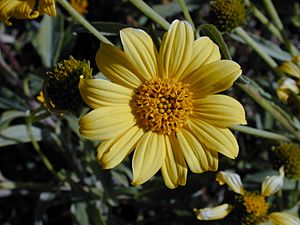Shrubland nehe facts for kids
Quick facts for kids Lipochaeta lobata |
|
|---|---|
 |
|
| Conservation status | |
| Scientific classification | |
| Kingdom: | |
| (unranked): | |
| (unranked): | |
| (unranked): | |
| Order: | |
| Family: | |
| Genus: | |
| Species: |
L. lobata
|
| Binomial name | |
| Lipochaeta lobata (Gaudich.) DC.
|
|
The Lipochaeta lobata is a special kind of flowering plant. It's often called the shrubland nehe and belongs to the aster family, which includes sunflowers! This plant is endemic to Hawaii. This means it naturally grows only in Hawaii and nowhere else in the world. You can find it in dry, bushy areas near the coast and in dry forests on the islands of Oʻahu, Maui, and Niʻihau.
Contents
What is the Shrubland Nehe?
The shrubland nehe is a plant that grows in dry places. It is part of a big family of plants called aster. These plants often have flowers that look like daisies or sunflowers.
Where Does the Shrubland Nehe Grow?
This plant loves sunny, dry spots. It grows in areas called coastal dry shrublands. These are bushy areas close to the ocean. It also lives in dry forests. These forests don't get a lot of rain.
Hawaiian Islands Where it Lives
The shrubland nehe can be found on three main Hawaiian islands:
Why is the Shrubland Nehe Important?
The shrubland nehe is a unique part of Hawaii's nature. It helps make the islands special.
Understanding its Varieties
There are two slightly different types, or varieties, of this plant. One of them is called var. leptophylla.
What Does Endangered Mean?
One variety of the shrubland nehe, var. leptophylla, is listed as an endangered species by the United States government. This means there are very few of these plants left in the wild. They are at risk of disappearing forever if we don't protect them. Protecting endangered plants helps keep our planet healthy and full of different kinds of life.


